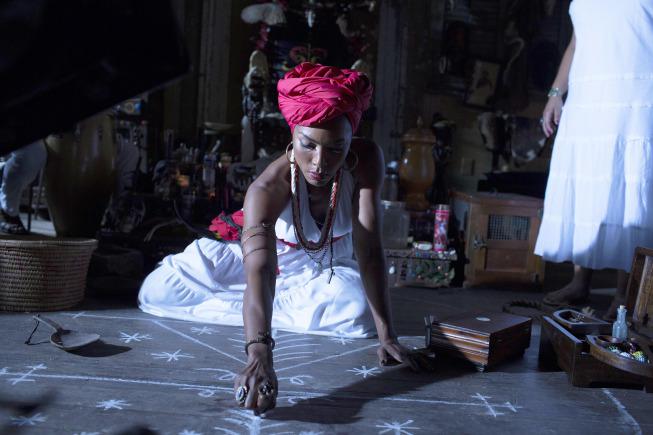Last night’s finale of American Horror Story: Coven left us with a lot of questions. What happened to the rest of that massive witch hunting organization? Are witches really “born that way”? Was Myrtle’s death-cry of “Balenciaga!” about more than just clothes? But here’s the mystery that’s bugging me most today: Where was Marie Laveau?
Yes, she had already died in the previous episode, but so had Fiona (allegedly). In this season, death really didn’t mean anything, especially if we hadn’t seen the body, so many thought Marie would come back for her last hurrah—some final resolution to her reign as Voodoo Queen of New Orleans for the past 200 years.
A lot of viewers were especially excited to see Angela Bassett on the small screen portraying the same character week after week. There were also those of us who enjoyed watching a powerful black female figure taking control of her destiny and righting the wrongs around her. It was a shock to learn of her death, but the double-disappointment of her not only dying but being forced to spend eternity in Hell with the most detestable character in the series was almost too much. How could Ryan Murphy and his team do this to her? Did she really deserve that kind of fate? Marie Laveau spent 200 years protecting her community providing a safe haven for other black women with special abilities, and the show put her in Hell with her tormentor?
We got Marie’s story in fragments, but by the end of the series, we have a pretty good idea of her life’s trajectory. She was young, beautiful, and powerful; when she wished for eternal life, Papa Legba happily provided in exchange for her soul. In actuality, her immortality was more of a loan–she could keep it as long as she did an initially unspecified “task” for Papa Legba once a year. If she couldn’t pay, he’d cash in that soul and drag her to the Underworld.
Deals with the devil are ill-advised, but from what we saw, Marie used her immortality to do a lot of good. She buried Madame LaLaurie in a box for eternity as punishment for her crimes against Black people, and she raised the dead to punish the white men who lynched a black child in the 1960s. Marie strikes me as the type of character who probably did that sort of thing repeatedly; the flashback only served as one example. Additionally, she offered a haven. When she extended the hands of safety and hospitality to Queenie, I had no doubt she had done it before to countless black women over the past two centuries.
On the other side of the coin, Marie’s body count of innocent victims can’t be ignored. She hanged Madame LaLaurie’s entire family and put them on display as revenge. The Minotaur she sent to kill Madame was ultimately intercepted by Queenie who would have died had Fiona not shown up save her. The army of undead she sent to the Academy attacked indiscriminately, killing bystanders and nearly killing Luke. She gave up her own baby to Papa Legba and we have no idea how many other infants she had to offer as payment. She helped kill Nan to cover up her baby theft. She sent a witch hunter to destroy the coven even though she’d signed a truce with the previous Supreme, and Fiona, the current Supreme, had done nothing to provoke her.
For all the cheering we did behind Marie Laveau as a powerful black female leader, it’s impossible to turn a blind eye to the kind of person she really was. I’m sure being 200 years old, watching everyone you ever meet end up dead, having to snatch babies, and living with the memory of your tortured lost love might have a little something to do with how she conducts her business, but it doesn’t outright excuse her behavior. Can we honestly say her story should have had a happy ending considering the number of lives she ended, destroyed, or tried to?
Is Marie as bad as Madame LaLaurie? Of course not. But should her character have been redeemed? In the end, I just don’t think it’s possible. Despite all the good she did in her life, her sins, on balance, should make us stop just shy of feeling sympathy. After all, when you’re dealing with Papa Legba, redemption just isn’t part of the agreement.
This post originally appeared in an extended form on Rafi D’Angelo’s blog, So Let’s Talk About… Read more of him there, and follow him on Twitter @RafiDAngelo.
